Review by Peter Duncan
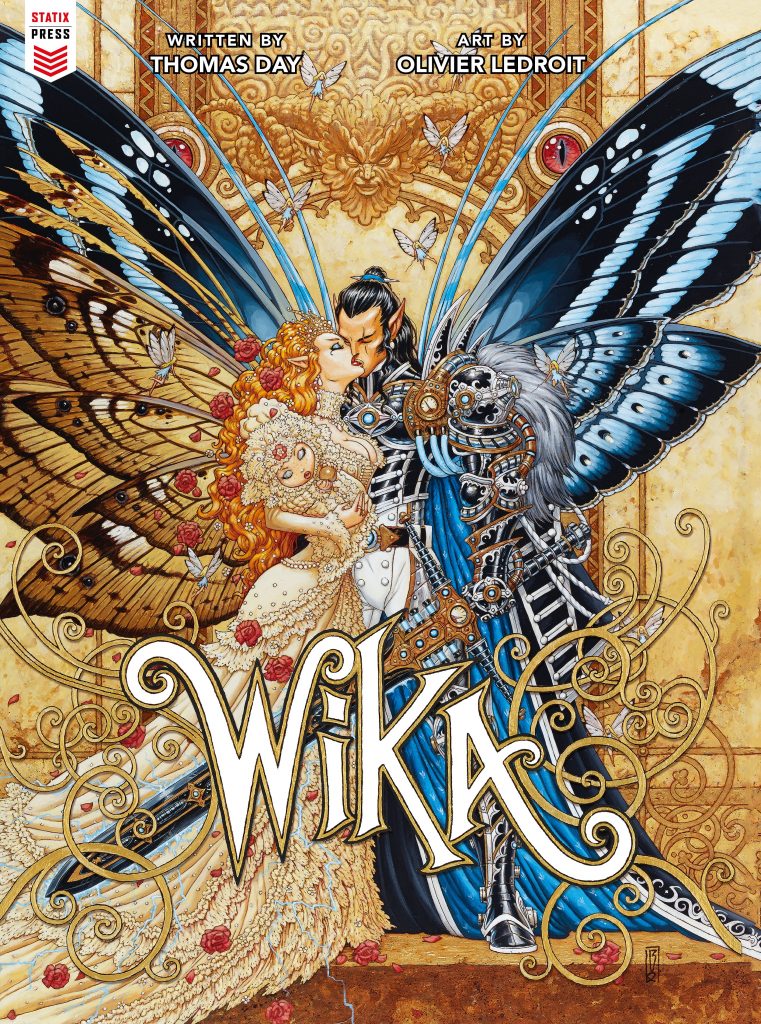
Over the last few years, Titan Comics has been publishing some of the best of European comics in handsome, hardcover editions through its Statix Press imprint. As such, it’s one of only a few publishers of European material in English whose books match their continental equivalents in terms of quality of production, and attention to detail.
Most notable among their publications have been the reprints of classic albums from French masters such as Bilal and Druillet. This month sees the publication of Wika, trailed extensively last year to the excitement of many, from the team of Thomas Day, an award-winning francophone science fiction and fantasy writer, and Oliver Ledroit, the Druillet-influenced artist best known in the UK as the artistic partner of Pat Mills on the Requiem, Vampire Knight books – and as the first artist on the hugely popular Black Moon Chronicles fantasy series.
Originally published by Glénat in three parts beginning in 2014, the Statix, English-language edition of Wika is a collected single edition, a huge volume running to more than 230 pages, translated by Christopher Pope.
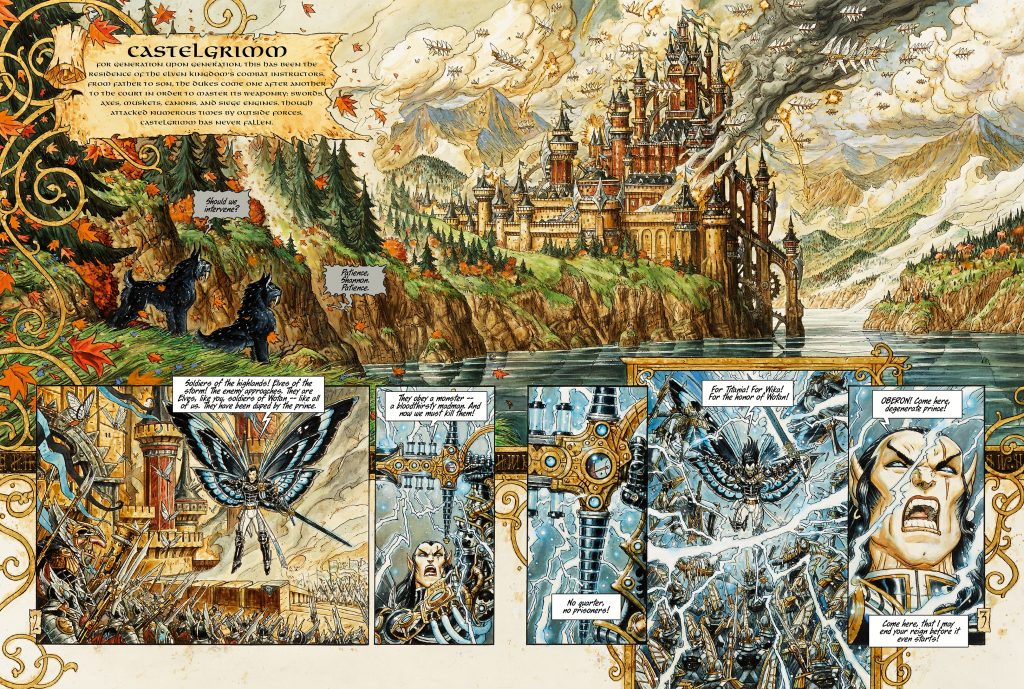
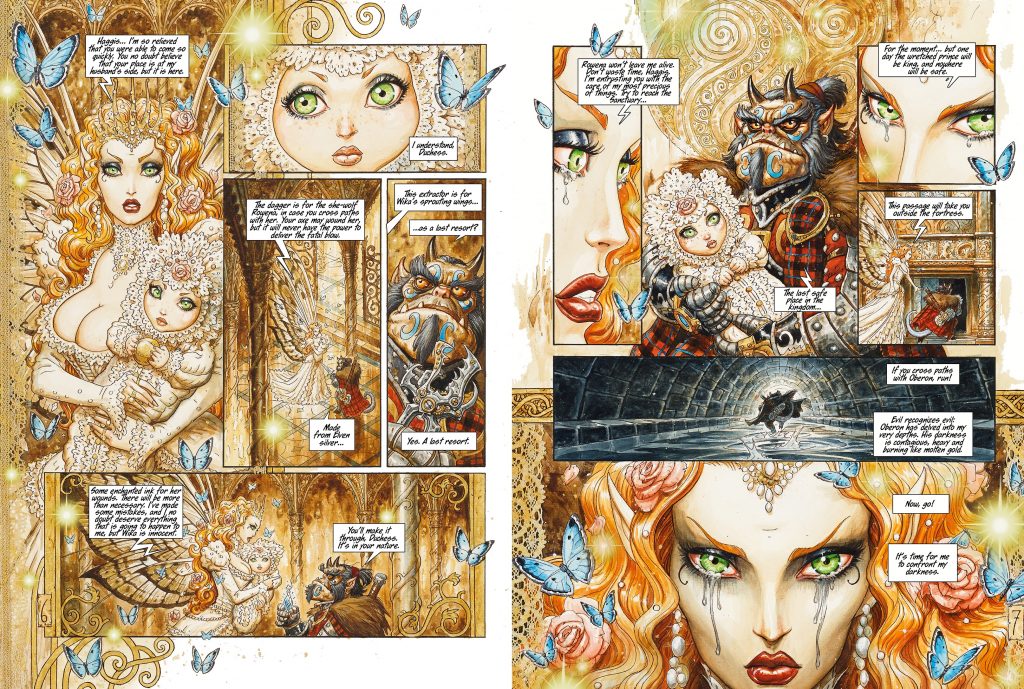
A fairy tale of sorts, set in Pan, a dark, fierce version of the land of faerie, Wika mixes Norse mythology, with steampunk imagery and the faerie of Shakespeare’s, A Midsummer Night’s Dream. It tells of Wika, the orphaned daughter of Claymore Grimm, a Duke of Pan, and his wife, Titania, the favoured child of the rapacious all-conquering ruler of the land, Wotan.
The book opens with our heroine Wika as a baby, being spirited away from the clutches of her uncle, Oberon, after he murders Grimm and Titania, his own sister, in an act of violent, incestuous jealousy. We follow Wika’s life through encounters with elves and dwarves and the offspring of her Uncle with a strange sort of she-wolf changeling, all the while following familiar fantasy themes, with revenge, retribution and romance playing large parts in the saga of her life.
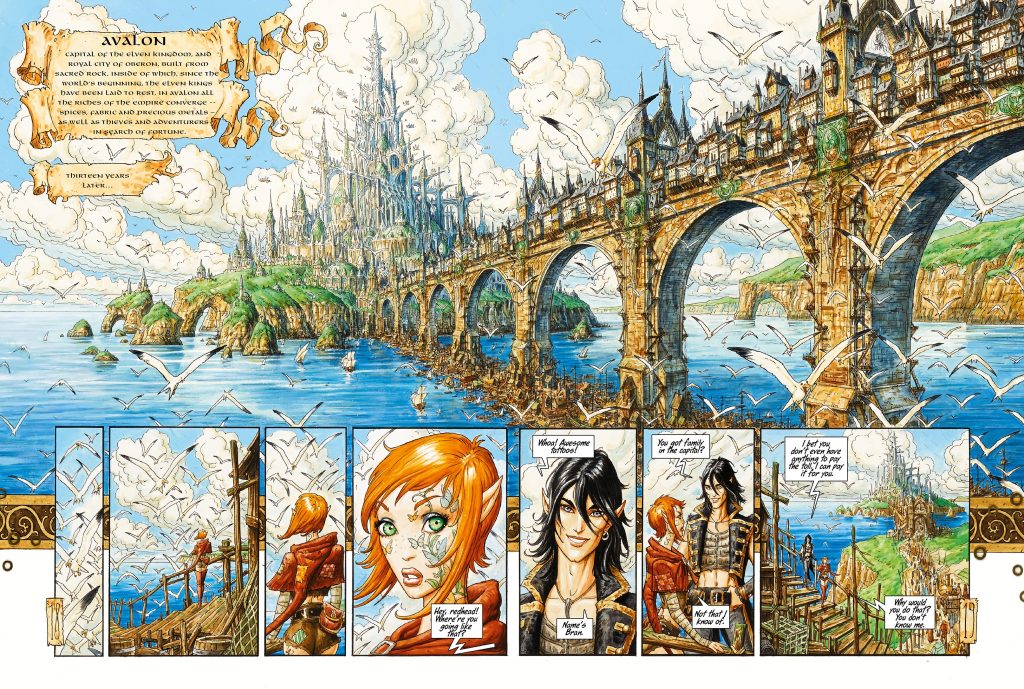
Her journey has a familiar, mythological air. But Pan is not a cozy world, the difference between hero and villain seeming to be more to do with perspective than morality, with the ‘Grand Fairies’ whose rivalries are at the heart of both the story and the world, being, at best, amoral creatures with little time for anyone else.
Even Wika herself gains sympathy by being beautiful and the intended prey of monsters, rather than through her own actions. Her apparent regard for mere humans is shown, in one early incident, to be transient and trivial. She is a hero because she is merely indifferent to lesser beings, rather than being actively cruel.
Epic in proportion and drawing inspiration and indeed, characters, from the Islandic sagas of the Norse gods, Thomas Day’s take on the land of fairy, of dwarves and elves, is one that is recognisably part of the modern fantasy genre but with more of the cruelty of genuine mythology than is usual. The addition of imagery from the steampunk genre adds originality and gives Oliver Ledroit some interesting visual tropes to play with.
His close dedication to echoing a genuine mythology is reenforced by the cyclical quality to the plot, with some pages of the finale mirroring aspects of the opening. For many, the version of classic myths that we have come to know has been the watered down, children’s versions of the original folk tales or the ‘proper’ and sanitised form of fantasy that comes from the school of Tolkien.
Wika and her world recall the stories of the Brothers Grimm, before Disney made sure they were suitable for children, or of Greek myths before they became classics to be studied and not tales of the lust and violence of the gods.
Day’s Pan is a world of magic and monsters and while being vastly different to the one we live in, its themes of deep rivalries between powerful creatures driving events, while ordinary creatures pay the price, is perhaps more familiar, and more timeless, than we might like to admit.
With this tale to tell a remarkable artist was required to do it justice, and Oliver Ledroit’s response to the scripts is simply spectacular. His figure work is unusual, highly stylized and ranges from the grotesque to the beautiful, but it is his page design that sets his work apart.
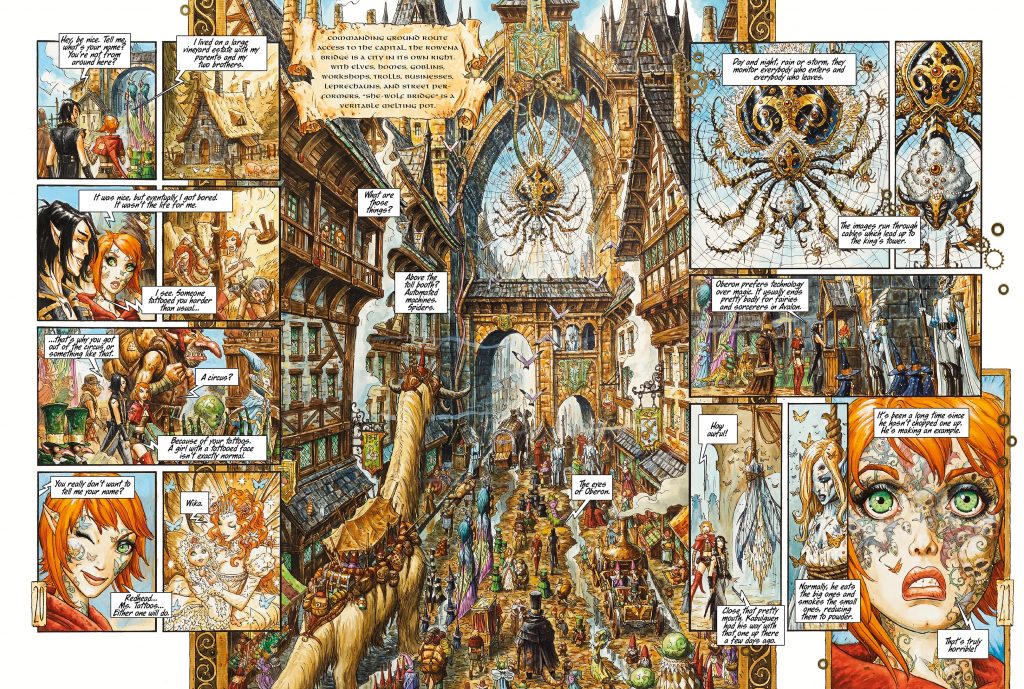
Every page is filled with incredibly detailed, textured backgrounds, framed with elaborate Celtic knots that draw the book together, giving it a consistent visual feel. This stylization, together with the predominance of pale yellows throughout, seems to recall Alphonse Mucha, the Czech, Art Noveau, painter, but is also a continuation of, Ledroit’s debt to French master storyteller Phillipe Druillet.
The level of detail in Ledroit’s pages occasionally threatens to overwhelm the story, with characters getting lost in the rich, intricate backgrounds. This is a distraction at first glance, but it quickly becomes clear that this is a book that cannot be read in the way most comics are. The art is not just an illustration to be skimmed over, it hides important details that need to be found, indeed searched for, if the story is to be fully appreciated.
This forces the reader to take more time, to study panels, to seek out the important details and actions. Characters can be spied in mirrors or standing in the background of crowd scenes. It is obviously a deliberate strategy, one that successfully draws the reader into the story and controls the pace of the book.
Overall, Wika is a book I find hard to sum up. Ledroit’s art is fascinating and intricate and while he continues to borrow heavily from Philippe Druillet, he has moved way beyond homage and added much that is his own. The mixture of fairy tale sweetness and steampunk grit that writer Thomas Day asks him to deliver is a perfect blend and the epic sweep of his complex multi-page spreads are stunning highlights of the book.
That being said, the combination of overtly sexual imagery with violence, particularly in the opening sequence of what was the first volume of the French edition, is disconcerting. Arguably it perfectly depicts writer Day’s intention to reflect the original fables and legends that are the story’s inspiration rather than the watered-down versions that most of us grew up with.
That things are toned down, just a little, as the story goes on may show a gradual change in exactly what was considered appropriate over the years between first and last volume. Still, there are one or two images which will give some readers pause. But overall, Thomas Day’s debut as a comics writer and his partnership with Oliver Ledroit is a spectacular success and promises much for the future.
Peter Duncan
Wika by Thomas Day and Olivier Ledroit
Translated by Christopher Pope
Letters by Jessica Burton
Out: 6th April 2021
Publisher: Titan Comics/ Statix Press
Format:Hardcover
Extent: 232pp
ISBN:9781787735927
Peter Duncan is editor of Sector 13, Belfast’s 2000AD fanzine and Splank! – an anthology of strips inspired by the Odhams titles, Wham!, Smash! and Pow! He’s also writer of Cthulhu Kids. Full details of his comics activities can be found at www.boxofrainmag.co.uk
Categories: downthetubes Comics News, downthetubes News, Features, Reviews
 In Review: The Leopard from Lime Street – Birthright
In Review: The Leopard from Lime Street – Birthright  In Review: Psycho Gran Comic Capers Cavalcade by David Leach
In Review: Psycho Gran Comic Capers Cavalcade by David Leach  La Belle Adventure – A new European Graphic Novel bookshop in Edinburgh
La Belle Adventure – A new European Graphic Novel bookshop in Edinburgh  In Pictures and Review: Lawless 2024
In Pictures and Review: Lawless 2024